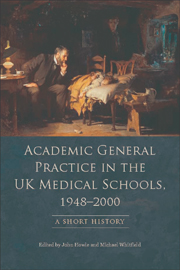Book contents
- Frontmatter
- Contents
- Preface
- Acknowledgements
- Abbreviations
- Timeline
- Introduction
- Dedication
- 1 The University of Aberdeen
- 2 The University of Dundee
- 3 The University of Edinburgh
- 4 The University of Glasgow
- 5 The Cardiff University School of Medicine
- 6 Academic General Practice in Ireland
- 7 The University of Birmingham
- 8 The University of Bristol
- 9 The University of Cambridge
- 10 The University of Exeter
- 11 The University of Leeds
- 12 The University of Leicester
- 13 The University of Liverpool
- 14 The University of Manchester
- 15 The University of Newcastle
- 16 The University of Nottingham
- 17 The University of Oxford
- 18 The University of Sheffield
- 19 The University of Southampton
- 20 The London Medical Schools
- 21 The University of St Andrews
- Appendix 1 Primary Care in the New Medical Schools
- Appendix 2 The SIFT/ACT Negotiations
- Appendix 3 An Overview
- Appendix 4 And Finally…
- Index
3 - The University of Edinburgh
Published online by Cambridge University Press: 05 August 2013
- Frontmatter
- Contents
- Preface
- Acknowledgements
- Abbreviations
- Timeline
- Introduction
- Dedication
- 1 The University of Aberdeen
- 2 The University of Dundee
- 3 The University of Edinburgh
- 4 The University of Glasgow
- 5 The Cardiff University School of Medicine
- 6 Academic General Practice in Ireland
- 7 The University of Birmingham
- 8 The University of Bristol
- 9 The University of Cambridge
- 10 The University of Exeter
- 11 The University of Leeds
- 12 The University of Leicester
- 13 The University of Liverpool
- 14 The University of Manchester
- 15 The University of Newcastle
- 16 The University of Nottingham
- 17 The University of Oxford
- 18 The University of Sheffield
- 19 The University of Southampton
- 20 The London Medical Schools
- 21 The University of St Andrews
- Appendix 1 Primary Care in the New Medical Schools
- Appendix 2 The SIFT/ACT Negotiations
- Appendix 3 An Overview
- Appendix 4 And Finally…
- Index
Summary
During the second half of the eighteenth century, Andrew Duncan – then professor of medicine in the University of Edinburgh – proposed and constructed a public dispensary to provide care to the sick poor in the Old Town of Edinburgh and to instruct medical students. From 1890 attendance at one of several public dispensary practices became a compulsory part of the Edinburgh undergraduate curriculum.
As in many UK medical schools, the development of the academic department owed much to the foresight and opportunism of senior academic public health/social medicine physicians. In Edinburgh, Professor Frank Crew recognised that the closure of the public dispensaries at the start of the NHS in 1948 would be an important loss to the education of medical students. In 1947, Richard Scott, then a lecturer in Crew's department and with pre-war experience in general practice, embarked on a project to explore the medical and social needs of families in sickness and in health, and together they sought to establish a ‘laboratory in the community’ to provide teaching to medical students and for long-term studies of illness within families.
So, on the first day of the NHS in July 1948, Richard Scott together with a medical assistant, an almoner, a nurse and a dentist set up an NHS practice within the Royal Public Dispensary in West Richmond Street. By 1951 some thirty medical students each year were being provided with a three-month course of clinical instruction, and in 1952 the Rockefeller Foundation offered financial support to aid the development of general practice as an academic discipline.
- Type
- Chapter
- Information
- Academic General Practice in the UK Medical Schools, 1948-2000A Short History, pp. 9 - 12Publisher: Edinburgh University PressPrint publication year: 2011



